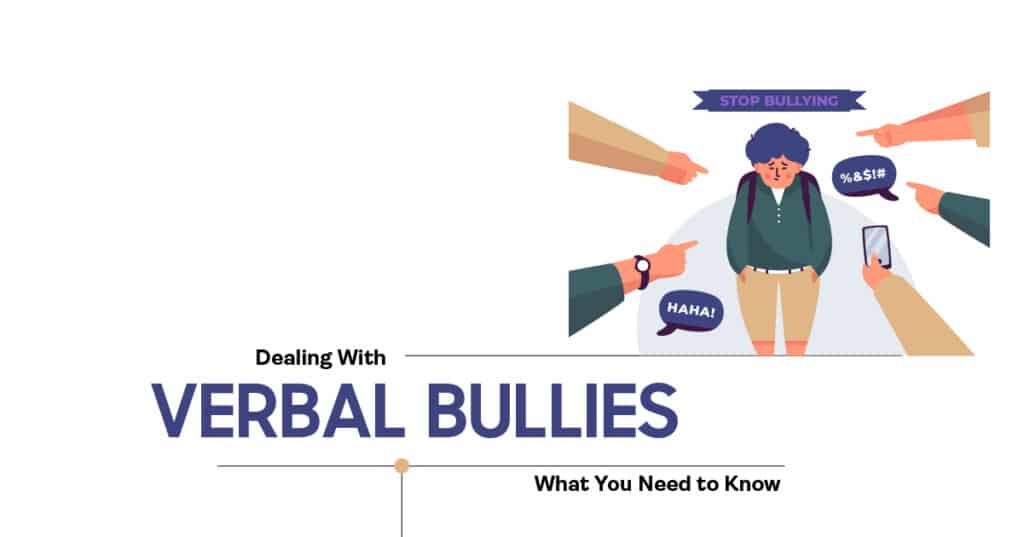Verbal bullying is often overlooked because it doesn’t leave physical marks, but its emotional and psychological impact can be just as damaging as physical abuse. Whether in schools, workplaces, or online, constant ridicule, insults, and humiliation can lead to long-term consequences for victims. Many people struggle to identify verbal bullying examples or understand its full impact, which allows this harmful behavior to continue unchecked.
To effectively address verbal bullying, it is crucial to recognize the signs of verbal bullying, understand its consequences, and explore practical solutions. This article will discuss verbal bullying in schools, its effects, and bullying prevention strategies that can help individuals and communities take action. We will also explore verbal abuse vs. verbal bullying, laws against verbal bullying, and how to stop verbal bullying to ensure that victims receive the support they need.
Understanding Verbal Bullying
Verbal bullying is the act of using words to harm, intimidate, or belittle another person. Unlike physical bullying, which involves direct physical harm, verbal attacks target an individual’s self-worth, making them feel powerless and unworthy.
The insults and taunts used in verbal bullying are designed to humiliate and control the victim. In some cases, this type of bullying is dismissed as harmless teasing, but when it becomes persistent and damaging, it can have severe psychological consequences.
The Impact of Verbal Bullying on Victims
Victims of verbal bullying may be subjected to constant name-calling, public humiliation, or the spreading of false rumors. These tactics are meant to isolate the victim and create an environment where they feel unsafe or unwanted. Unlike a one-time argument, verbal bullying is repetitive and intentional, designed to break a person’s confidence over time.
Common Examples of Verbal Bullying
Recognizing examples of verbal bullying is the first step in addressing the problem. Some common forms include persistent teasing about someone’s appearance, intelligence, or background. It can manifest as belittling comments, passive-aggressive remarks, or exclusion from essential conversations in professional settings. Online, verbal bullying takes the form of cyberbullying, where individuals use social media and messaging platforms to harass their victims.
The Effects of Verbal Bullying
The effects of verbal bullying can be severe and long-lasting, impacting both mental and emotional well-being. In the short term, victims may experience anxiety, stress, and a loss of confidence. Many begin to doubt themselves and withdraw from social interactions to avoid further ridicule. The emotional distress caused by verbal bullying can interfere with academic performance, workplace productivity, and personal relationships.
Long-Term Psychological Effects of Verbal Bullying
Over time, the long-term effects of bullying can lead to more serious psychological issues, including chronic depression, social anxiety, and self-destructive behaviors. Victims may develop an ongoing fear of judgment, making it difficult for them to express themselves openly. In severe cases, prolonged exposure to verbal bullying can contribute to suicidal thoughts or tendencies, highlighting the urgent need for intervention.
The Impact of Verbal Bullying in Schools
The consequences of verbal bullying in schools can be particularly damaging to young students. Children and teenagers who experience constant verbal attacks may struggle with low self-esteem, making it harder for them to focus on their studies or build healthy friendships. If verbal bullying is left unchecked, it can shape the way victims see themselves well into adulthood.
Signs of Verbal Bullying: How to Recognize It
Identifying the signs of verbal bullying can help victims and bystanders take action before the situation worsens. People who are verbally bullied often exhibit changes in behavior, such as withdrawing from social interactions, avoiding specific people or places, or showing signs of emotional distress. They may appear anxious, sad, or unusually quiet, struggling to express themselves due to the constant belittlement they face.
Effects of Verbal Bullying in Schools and Workplaces
In schools, students who experience verbal bullying may suddenly lose interest in attending classes, experience a drop in grades, or develop social anxiety. Similarly, in the workplace, targeted employees may avoid group meetings, hesitate to share ideas, or experience a decline in work performance. Recognizing these patterns can help parents, teachers, and employers address verbal bullying before it escalates.
Verbal Bullying in Schools: A Serious Issue
Verbal bullying in schools is a growing concern, affecting students of all ages. Unlike physical bullying, which is more noticeable, verbal attacks often go unnoticed or are dismissed as harmless teasing. However, repeated name-calling, insults, and social exclusion can take a toll on a child’s mental health.
The Impact of Verbal Bullying on Academic Performance
Students who experience verbal bullying often struggle academically because the constant ridicule affects their ability to concentrate. Their emotional stress can make them reluctant to participate in classroom discussions or extracurricular activities. Over time, this withdrawal can lead to isolation, making it even harder for them to seek help.
The Role of Educators in Bullying Prevention
Educators and school administrators play a crucial role in preventing verbal bullying by implementing prevention strategies promoting kindness and inclusivity. Anti-bullying policies should be strictly enforced, and students should be encouraged to report incidents of verbal bullying without fear of retaliation.
How to Stop Verbal Bullying: Effective Strategies
Understanding how to stop verbal bullying requires both immediate and long-term solutions. When confronted with verbal bullying, victims can adopt assertive communication techniques to defuse the situation. Responding with confidence and refusing to engage with bullies can weaken their influence. However, if the bullying persists, it is crucial to seek support from trusted individuals, such as teachers, counselors, or supervisors.
Implementing Effective Bullying Prevention Strategies
For a lasting impact, communities must adopt bullying prevention strategies that address the root causes of verbal bullying. Schools should introduce anti-bullying programs that teach students about empathy, respect, and the consequences of harmful speech. Workplaces should enforce strict policies against verbal harassment, ensuring employees feel safe and valued.
Parents can also play a significant role in stopping verbal bullying by fostering open communication with their children. Encouraging kids to talk about their experiences can help identify problems early on and provide them with the emotional support they need.
Verbal Abuse Vs. Verbal Bullying: What’s the Difference?
The terms verbal abuse vs. verbal bullying are often used interchangeably, but they have distinct differences. Verbal bullying typically occurs among peers, such as classmates or coworkers, and is motivated by a desire for social control or dominance. Verbal abuse, on the other hand, often happens in personal relationships, such as between a parent and child or romantic partners.
While both forms of mistreatment involve harmful language, verbal abuse is usually part of a larger pattern of manipulation and control. Understanding the difference is crucial in determining the best course of action for victims. In cases of verbal abuse, seeking professional support or legal intervention may be necessary.
Laws Against Verbal Bullying: What You Should Know
Many regions have laws against verbal bullying, mainly involving harassment, threats, or discrimination. While some forms of verbal bullying may not be explicitly illegal, repeated harassment can be classified as verbal assault or cyber harassment. In schools, strict anti-bullying policies are often in place to protect students, and victims can report incidents to school administrators.
Legal Protections Against Verbal Bullying in the Workplace
Employees who experience verbal bullying in the workplace may have legal grounds to file a complaint if the behavior violates anti-harassment policies. Cyberbullying, which often includes verbal bullying, is increasingly being addressed by law, mainly when it involves public shaming, threats, or defamation.
Understanding Laws Against Verbal Bullying
Understanding laws against verbal bullying can help victims take legal action if necessary. Consulting legal professionals or reporting severe cases to authorities can provide protection and ensure that bullies are held accountable for their actions.
Taking a Stand Against Verbal Bullying
Verbal bullying is not just a minor issue – it has real and lasting consequences. Recognizing the signs of verbal bullying and understanding the effects of verbal bullying can empower victims and bystanders to take action. We can create a safer and more respectful society by implementing effective bullying prevention strategies and enforcing strict laws against verbal bullying.
If you or someone you know is experiencing verbal bullying, don’t stay silent. Speak up, seek support, and take a stand against bullying today.
Finding the Right Support for Recovery at Treat Mental Health Texas
Recovering from verbal bullying requires more than just time – it demands the right support system and professional guidance. At Treat Mental Health Texas, we understand the deep emotional scars that verbal bullying can leave behind and provide compassionate, evidence-based care to help individuals heal.
Whether you are dealing with the long-term effects of bullying or struggling with self-esteem issues caused by verbal bullying in schools or the workplace, our team of mental health professionals is here to help. We offer personalized therapy sessions, group support, and effective coping strategies to help you rebuild confidence and emotional resilience.
If you or a loved one is suffering from the effects of verbal bullying, don’t go through it alone. Treat Mental Health Texas provides a safe, supportive space to express yourself, heal, and regain control of your life. Contact us today to take the first step toward recovery.
FAQs
How do you recognize verbal bullying?
Verbal bullying includes name-calling, insults, humiliation, and spreading false rumors. Victims may withdraw, show anxiety, or avoid social situations.
How do you respond to a verbal bully?
Stay calm, set clear boundaries, and avoid reacting emotionally. If the behavior continues, seek support from teachers, supervisors, or trusted individuals.
What does verbal abuse look like?
Verbal abuse vs. verbal bullying differs in context – verbal abuse occurs in personal relationships, while verbal bullying happens in schools, workplaces, or online to humiliate or isolate.
What are the long-term effects of verbal bullying?
Long-term effects of bullying include low self-esteem, anxiety, depression, and difficulty forming healthy relationships.
What can schools do to prevent verbal bullying?
Schools should enforce bullying prevention strategies, promote kindness, and encourage students to report verbal bullying without fear of retaliation.







